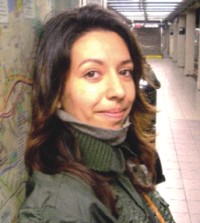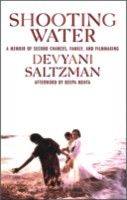| Interview
A Memoir of Second Chances
 |
Devyani Saltzman |
In an interview with the Star Weekend Magazine writer-filmmaker Devyani Saltzman talks about her work and her relationship with her mother Deepa Mehta
Ahmede Hussain How do you see religious extremism--both Hindu and Muslim--in South Asia? Some describe you as a Jewish-Hindu; how do you perceive this?
Devyani Saltzman: I see religious extremism, within any community, as an unfortunate waste of time. Although I was raised in Canada, I've spent a good deal of time with my maternal grandparents in New Delhi. Over the years I've found reports of communal violence whether Ayodhya or attacks against Christians - to be heartbreaking. Communities should work together to build a stronger social fabric, not rip it apart because of overemphasised differences.
My views are very much informed by my upbringing. I was raised half-Hindu, half-Jewish, and my parents always encouraged a respect for both faiths and cultures. I could never judge another person based on their background, since I was from multiple backgrounds myself. Many people have asked me if I feel 'lost' because of this heritage. In fact, I feel lucky to have it. It's probably what led me to study anthropology in university and become a writer. By not quite fitting into one place, I've been able to have a unique space from which to observe life.
In 'Shooting Water' your portrayal of mother-daughter relationship has been brilliant, and the way you have made this evolve is fascinating. How do you see individual's role in history?
 Devyani Saltzman: When I sat down to write Shooting Water, I scribbled three things in my notebook 'political, cinematic and personal'. I've always loved stories which balance an intimate narrative within a larger historical or political context. When Water was shutdown in India, 1999, the media covered the events. But I always felt the sound bytes didn't do justice to the five-year history of the film, Hindutva and freedom of expression. I wanted to write that history, but within my own personal experiences on the set of the film, both in India and then in Sri Lanka. Devyani Saltzman: When I sat down to write Shooting Water, I scribbled three things in my notebook 'political, cinematic and personal'. I've always loved stories which balance an intimate narrative within a larger historical or political context. When Water was shutdown in India, 1999, the media covered the events. But I always felt the sound bytes didn't do justice to the five-year history of the film, Hindutva and freedom of expression. I wanted to write that history, but within my own personal experiences on the set of the film, both in India and then in Sri Lanka.
The heart of the story is reconstructing my relationship with my mother after my parents divorce, but it is through the individual's history that the history of politics and place are revealed.
How free do you think as a woman and as a writer?
Devyani Saltzman: I feel quite free as both a woman and a writer. I've never encountered censorship of my writing, or discouragement based on my gender. I think my greatest constraints are probably my own doubts while working. I find the most important thing about writing is to suspend self-judgement during the process.
In terms of freedom, I was raised with filmmaker parents who always encouraged an awareness of social justice, and often focused on those issues in their work. Fire, the first film in my mother's Elements trilogy, is about women searching for freedom and love within an unhappy arranged marriage. Water is about women searching for a sense of freedom within the constraints of their religion. I think both my parents and I feel it's important to use the opportunities we've been given to highlight and discuss those who might be denied their freedoms.
How does it feel to be Deepa Mehta's daughter?
Devyani Saltzman: Well, it's actually quite normal. She is my mother, and long before she made her first film, she was taking me to school and spending time with my Dad and I. She will always be my mom first. I admire her work very much, but it is no more the focus of our lives together, than cooking, or going to watch a movie at the local multiplex.
I grew up going to film screenings and visiting my parents on set. It was the family business, and often not very glamorous. If anything, as I've begun to work as a writer we have a newfound creative relationship. She's my first reader for my manuscripts and articles, and I'm her first reader on new script ideas.
Will you share your future project with our readers?
Devyani Saltzman: I'm currently working on a novel about a young woman peacekeeper. I've always been fascinated by ordinary civilians who go into war zones, that are often not within their own nation or culture, for a larger ideal of peace. In between Shooting Water and the novel, I've been writing articles for different publications, including Canada's national newspaper, Marie Claire and an anthology of new Toronto writing.
Is Shooting Water a memoir or is it a work of fiction? Where do you think the line is drawn?
Devyani Saltzman: Shooting Water is definitely a memoir, not a work of fiction. But I think inherent in the memoir is that the reader knows the story is coming through the filter of the author's memory and perspective. I didn't sit down to write a non-fiction journalistic account of the shutdown of Water. I sat down to write the story of my family, which included the shutdown and political violence we encountered. The line between fiction and nonfiction has always been unclear. One draws from life experience in both forms. One also embellishes in both forms, whether through description or what you choose to include and/or leave out of the narrative. Some of my favourite books are memoir or literary non-fiction. I was very inspired by New Zealand writer Janet Frame's account of her own life growing up, 'An Angel at My Table'. I've also been a long time fan of travel writing, including the work of Bruce Chatwin, William Dalrymple and Jan Morris.
Copyright
(R) thedailystar.net 2007 |
